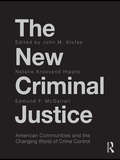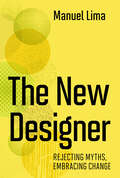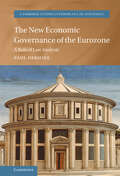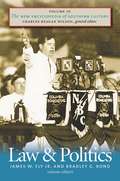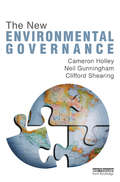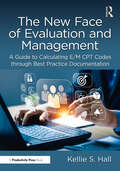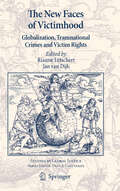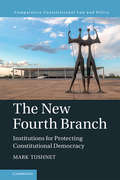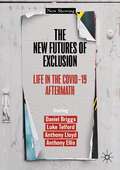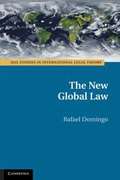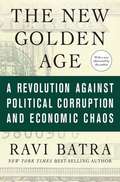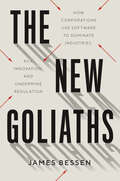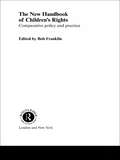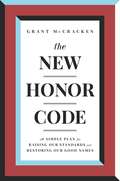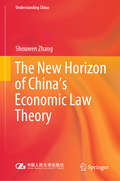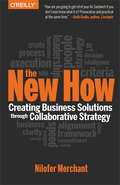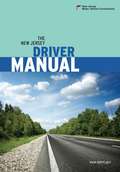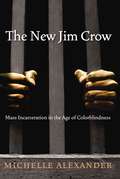- Table View
- List View
The New Criminal Justice: American Communities and the Changing World of Crime Control
by John Klofas Natalie Kroovand Hipple Edmund McGarrellCriminal Justice in the United States is in the midst of momentous changes: an era of low crime rates not seen since the 1960s, and a variety of budget crunches also exerting profound impacts on the system. This is the first book available to chronicle these changes and suggest a new, emerging model to the Criminal Justice system, emphasizing: collaboration across agencies previously viewed as relatively autonomous a focus on location problems and local solutions rather than a widely shared understanding of crime or broad application of similar interventions a deep commitment to research which guides problem assessment and policy formulation and intervention. Ideal for use in graduate, as well as undergraduate capstone courses.
The New Deal Lawyers
by Peter H. IronsFrom the perspective of young lawyers in three key New Deal agencies, this book traces the path of crucial constitutional test cases during the years from 1933 to 1937.
The New Debtors' Prison: Why All Americans Are in Danger of Losing Their Freedom
by Paul Lonardo Christopher B. MaselliDebtors’ prisons might sound like something out of a Dickens novel, but what most Americans do not realize is that they are alive and well in a new and startling form. Today more than 20 percent of the prison population is incarcerated for financial reasons such as failing to pay a fine. This alarming trend not only affects the poor, who are hit particularly hard, but also ensnares the millions of self-identified middle-class people who are struggling to make ends meet. All across the country people are being fined and even imprisoned for offenses as small as delinquency on student debt or an unpaid parking ticket. However, there is an insidious undercurrent to these practices that the average person might not realize. Many counties depend on a steady supply of citizens to pay fines and court costs in order to make their budgets. Minor vehicle infractions, by design, can rack up hundreds of dollars in charges that go straight to the city’s coffers. Combine this with the fact that many middle-class people cannot handle an unexpected $400 expense and the general lack of awareness about the risk for being repeatedly jailed for failure to pay court costs, probation, and even per day charges for being in jail and you get an endless cycle of men and women either in debt or in prison for debt. While shocking to some, this system makes up today’s debtors’ prisons. In The New Debtors’ Prison, Christopher Maselli draws from his personal knowledge of the criminal justice system based on his experience on both sides of the prison walls as an attorney as well as a former inmate, to take a hard look at our modern prison system that systematically targets the poor and vulnerable of our society in order to fund the prison-industrial complex.
The New Deportations Delirium: Interdisciplinary Responses (Citizenship and Migration in the Americas #7)
by Daniel Kanstroom M. Brinton LykesSince 1996, when the deportation laws were hardened, millions of migrants to the U.S., including many long-term legal permanent residents with “green cards,” have experienced summary arrest, incarceration without bail, transfer to remote detention facilities, and deportation without counsel—a life-time banishment from what is, in many cases, the only country they have ever known. U.S.-based families and communities face the loss of a worker, neighbor, spouse, parent, or child. Many of the deported are “sentenced home” to a country which they only knew as an infant, whose language they do not speak, or where a family lives in extreme poverty or indebtedness for not yet being able to pay the costs of their previous migration. But what does this actually look like and what are the systems and processes and who are the people who are enforcing deportation policies and practices? The New Deportations Delirium responds to these questions.Taken as a whole, the volume raises consciousness about the complexities of the issues and argues for the interdisciplinary dialogue and response. Over the course of the book, deportation policy is debated by lawyers, judges, social workers, researchers, and clinical and community psychologists as well as educators, researchers, and community activists. The New Deportations Delirium presents a fresh conversation and urges a holistic response to the complex realities facing not only migrants but also the wider U.S. society in which they have sought a better life.
The New Designer: Rejecting Myths, Embracing Change
by Manuel LimaHow to develop an ethical design practice and build a better world.The choices made by designers have a significant effect on the world. Yet so much of the discourse on design focuses on aesthetics rather than ethics. In The New Designer, acclaimed author Manuel Lima aims to change this by challenging common myths and preconceptions about what comprises good design. He argues that designers must take responsibility for the personal, societal, cultural, and environmental impact of their work, rather than simply following a standard template.As he covers fields ranging from graphic design to industrial design to user-experience design, Lima identifies the major steps that designers must take to be a force for good in the world. Rather than sticking to outmoded ideas about perfectionism and individual genius, designers must work together to tackle some of the most challenging questions of the twenty-first century. How do you make room for humanity, with all its wondrous variations, in a society increasingly driven by metrics, algorithms, and profit? How can ecologically responsible designers consider a product&’s entire life cycle and look well into the future? And how can designers better respond to a community&’s local needs while taking advantage of global networks?Blending approaches derived from ethics, psychology, economics, and ecology, The New Designer is a vital, field-changing treatise that will appeal to any reader who seeks to understand design&’s massive influence on the contemporary world.
The New Economic Governance of the Eurozone: A Rule of Law Analysis (Cambridge Studies in European Law and Policy)
by Paul DermineThe Eurozone and the European Union have recently been confronted with a number of existential threats. The sovereign debt crisis and the COVID-19 pandemic have forced European decisionmakers to pass important reforms which have radically transformed the nature and scope of the Union's powers in the field of economic and fiscal policy. As the new economic governance of the Eurozone emerges as the main driver of integration in today's Europe, this book seeks to assess the solidity of the constitutional foundations supporting that system, and its compliance with the Union's core founding value: the rule of law. Using competence allocation, regulatory quality, access to external review and fundamental rights sustainability as analytical benchmarks, this book argues that the recent metamorphosis of Eurozone economic governance has not been accompanied by a parallel strengthening of its constitutional settlement, leading to a problematic misalignment between the Union's action and its governing principles.
The New Encyclopedia of Southern Culture: Law and Politics
by James W. Ely Bradley G. BondVolume 10 of The New Encyclopedia of Southern Culture combines two of the sections from the original edition, adding extensive updates and 53 entirely new articles. In the law section of this volume, 16 longer essays address broad concepts ranging from law schools to family law, from labor relations to school prayer. The 43 topical entries focus on specific legal cases and individuals, including historical legal professionals, parties from landmark cases, and even the fictional character Atticus Finch, highlighting the roles these individuals have played in shaping the identity of the region. The politics section includes 34 essays on matters such as Reconstruction, social class and politics, and immigration policy. New essays reflect the changing nature of southern politics, away from the one-party system long known as the "solid South" to the lively two-party politics now in play in the region. Seventy shorter topical entries cover individual politicians, political thinkers, and activists who have made significant contributions to the shaping of southern politics.
The New Entrants Problem in International Fisheries Law
by Andrew SerdyAre international fisheries heading away from open access to a global commons towards a regime of property rights? The distributional implications of denying access to newcomers and re-entrants that used the resource in the past are fraught. Should the winners in this process compensate the losers and, if so, how? Regional Fisheries Management Organisations, in whose gift participatory rights increasingly lie, are perceptibly shifting their attention to this approach, which has hitherto been little analysed; this book provides a review of the practice of these bodies and the States that are their members. The recently favoured response of governments, combating 'IUU' - illegal, unregulated and unreported - fishing, is shown to rest on a flawed concept, and the solution might lie less in law than in legal policy: compulsory dispute settlement to moderate their claims and an expansion of the possibilities of trading of quotas to make solving the global overcapacity issue easier.
The New Environmental Governance
by Clifford Shearing Cameron Holley Neil GunninghamA bold and profoundly new way of governing environmental problems is palpable around the globe and aims to overcome the limitations of the interventionist state and its market alternative to offer more effective and legitimate solutions to today's most pressing environmental problems. The 'new environmental governance' (NEG) emphasises a host of novel characteristics including participation, collaboration, deliberation, learning and adaptation and 'new' forms of accountability. While these unique features have generated significant praise from legal and governance scholars, there have been very few systematic evaluations of NEG in practice, and it is still unclear whether NEG will in fact 'work', and if so, when and how. This book offers one of the most rigorous research investigations into cutting edge trends in environmental governance to date. Focusing its inquiry around some of the most central, controversial and/or under researched characteristics of NEG, the book offers fresh insights into the conditions under which we can best achieve successful collaboration, effective learning and adaptation, meaningful participatory and deliberative governance and effective forms of accountability. The book synthesizes its findings to identify seven key pillars of 'good' NEG that are central to its success and will provide useful guidance for policymakers and scholars seeking to apply new governance to a wide range of environmental and non-environmental policy contexts. The book also advances our understanding of State governance and will be a valuable reference for scholars, researchers and students working in law and regulation studies - especially in the field of environmental law.
The New Eugenics: Selective Breeding in an Era of Reproductive Technologies
by Prof. Judith DaarA provocative examination of how unequal access to reproductive technology replays the sins of the eugenics movement Eugenics, the effort to improve the human species by inhibiting reproduction of "inferior" genetic strains, ultimately came to be regarded as the great shame of the Progressive movement. Judith Daar, a prominent expert on the intersection of law and medicine, argues that current attitudes toward the potential users of modern assisted reproductive technologies threaten to replicate eugenics' same discriminatory practices. In this book, Daar asserts how barriers that block certain people's access to reproductive technologies are often founded on biases rooted in notions of class, race, and marital status. As a result, poor, minority, unmarried, disabled, and LGBT individuals are denied technologies available to well-off nonminority heterosexual applicants. An original argument on a highly emotional and important issue, this work offers a surprising departure from more familiar arguments on the issue as it warns physicians, government agencies, and the general public against repeating the mistakes of the past.
The New Face of Evaluation and Management: A Guide to Calculating E/M CPT Codes through Best Practice Documentation
by Kellie HallPhysicians want to care for patients, not spend their time documenting in an electronic medical record. Physicians are always complaining about the amount of time they spend documenting patient care in support of medical billing through an evaluation and management coding system (E/M). New guidelines were created to lessen the time a physician/provider spends on documentation as many of the mandatory elements are no longer a requirement for calculating a code level. Previously an E/M (evaluation and management) note required documentation of history, exam, and medical decision-making with required elements in each component to support a level for payment. If an element was missing, the level of service was not supported; therefore, the code was lowered, resulting in a lower reimbursement for the physician/provider. The new guidelines eliminated the requirement of History and Exam as part of the calculation of a code level. Yes, an appropriate history and exam are required, this supports good patient care, but when it comes to reimbursement, they are no longer part of the picture.The overall system is not difficult, if time is taken to understand the elements and how they are applied in the documentation. Documentation is a “word game” always has been, the authors’ focus is to show what words to use to lessen the time but still convey the complexity of the patient’s condition, and how the physician/provider determines a treatment plan which includes the risk to the patient to satisfy the Coding guidelines initiated by Medicare and American Medical Association.This book evaluates the new guidelines and brings them into prospective so physicians/providers/coders can easily understand how to document and calculate the level of service for reimbursement. This is not a cumbersome book or complicated, but straight to the point. The main goal of the book is to educate physicians, nurses, and coders on what documentation is really required and what has just become habit over the last 30 years.
The New Faces of Victimhood
by Rianne Letschert Jan Van DijkBesides generating wealth, globalization makes victims, including victims of new forms of crime. In this edited book of scholarly essays, international lawyers and criminologists reflect on the legal challenges posed by these dark sides of globalization. Examples include transnational organised crime, human trafficking and corruption, cyber crimes, international terrorism, global corporate crime and cross-border environmental crimes. The authors reflect on the limits of domestic systems of justice in providing protection, empowerment and redress to the victims of these emerging forms of global insecurity. They argue for the need of better international or supra-national institutional arrangements such as legal instruments and actions of the United Nations or regional organizations such as the European Union. In part I Jan Van Dijk and Rianne Letschert present an overview of trends in criminal victimization against the backdrop of globalization using a unique set of statistical indicators. By placing this issue in the framework of the human security concept, the authors draw out its broader political and normative implications. Theologist Ralf Bodelier explains how modern communication technologies have heightened sensitivities among the general public for human insecurities anywhere in the world. In his view, a new global conscience is in the making that may become the cornerstone of international solidarity and action. Marc Groenhuijsen and Rianne Letschert describe the emergence of national and international legal and institutional arrangements to offer remedies to victims of crime in an era of globalization. In part II a selection of experts analyse the specific issues surrounding the protection and empowerment of victims of different types of international crimes such as human trafficking, organised crime/corruption, terrorism, global corporate crime and cross border environmental crimes. In part III focused attention is given to the special challenges and opportunities of protecting and assisting crime victims in cyberspace. Part IV deals with emerging victim issues in humanitarian law such as the accountability of private military companies and the implementation of the ambitious victim provisions in the statute of the International Criminal Court including the establishment of a global fund for reparations. In the final part of the book some of its core authors formulate their ideas about the international institutional arrangements that should be put in place to offer justice to the victims of globalization. A concrete proposal is made for the transformation of the United Nations 1985 Declaration on the Principles of Justice for Victims of Crime and Abuse of Power into a full-fledged UN convention. In the final chapter further proposals are made for the increased involvement of regional organisations such as the European Union in the protection of victims of global crime.
The New Fourth Branch: Institutions for Protecting Constitutional Democracy (Comparative Constitutional Law and Policy)
by Mark TushnetTwenty-first-century constitutions now typically include a new 'fourth branch' of government, a group of institutions charged with protecting constitutional democracy, including electoral management bodies, anticorruption agencies, and ombuds offices. This book offers the first general theory of the fourth branch; in a world where governance is exercised through political parties, we cannot be confident that the traditional three branches are enough to preserve constitutional democracy. The fourth branch institutions can, by concentrating within themselves distinctive forms of expertise, deploy that expertise more effectively than the traditional branches are capable of doing. However, several case studies of anticorruption efforts, electoral management bodies, and audit bureaus show that the fourth branch institutions do not always succeed in protecting constitutional democracy, and indeed sometimes undermine it. The book concludes with some cautionary notes about placing too much hope in these – or, indeed, in any – institutions as the guarantors of constitutional democracy.
The New Futures of Exclusion: Life in the Covid-19 Aftermath
by Daniel Briggs Anthony Lloyd Anthony Ellis Luke TelfordBased upon global data and following on from Lockdown: Social Harm in the COVID-19 Era, this book discusses the rise of surveillance capitalism and new forms of control and exclusion throughout the Covid-19 pandemic. It particularly addresses the use of vaccine passports, mandates and the new forms of capital extraction and political control that emerged throughout the pandemic. The book also explicates how the ‘vaccine hesitant’ became marginalized in both mainstream discourse and through regulatory interventions. Whilst the book addresses the wider political economy within which so-called ‘anti-vaxxers’ were ostracized, it also explores the complex nature of their sentiments. The book closes by considering The New Futures of Exclusion, outlining the forms of surveillance and control that may be implemented in the future particularly in light of the challenges brought by global warming and the energy transition. It is a broadly accessible text, particularly appealing to policymakers, general readers and academics in sociology, political sociology, politics, human geography, political economy, criminology, social policy, psychology, history, and infectious diseases and medicine.
The New Global Law
by Rafael DomingoThe purpose of this book series is to clarify and improve the theoretical foundations of international law. Too often the progressive development and implementation of international law have foundered on confusion about first principles. This series will raise the level of public and scholarly discussion about the structure and purpose of the world legal order and how best to achieve global justice through law.
The New Gold Rush: The Riches of Space Beckon!
by Joseph N. PeltonThis book captures the most exciting advances in the harnessing of space as a global resource. The authors track the growing number of space businesses and opportunities for investors, and the many possible benefits of spaceplanes, space stations and even space colonies. The authors also discuss the need for more regulatory reform. Companies like Planetary Resources are now forming to find mineral-rich asteroids and bring back new riches to Earth. Solar power satellites in the next few years will start to beam clean energy back to Earth, to meet the growing demands of a still-developing world. Innovative space industries are vital to the survival of modern human life, and the authors demonstrate what can be done to encourage the growing of the "New Space" frontier. From lassoing and then mining asteroids to developing new methods of defending the planet from space hazards and setting up new hotels and adventures for tourists in space, this new industry will have profound effects on Earth, especially on its economy. This book is based on a study of international experts commissioned ahead of the UNISPACE+50 meeting, having distilled the results of this comprehensive fact-finding process into a compact and very readable form. It can serve as an excellent starting point for understanding all the activities underway or planned to make space truly our next frontier.
The New Golden Age: The Coming Revolution against Political Corruption and Economic Chaos
by Ravi BatraBringing his signature insight and expertise, the controversial economist Ravi Batra takes on a host of problems facing the world economy, including the oil and housing bubbles, falling minimum wages, corporate scandals and gross ethical lapses.
The New Goliaths: How Corporations Use Software to Dominate Industries, Kill Innovation, and Undermine Regulation
by James BessenAn approach to reinvigorating economic competition that doesn’t break up corporate giants, but compels them to share their technology, data, and knowledge “Bessen is a master of unpacking the nuances of a complex array of interrelated trends to build a coherent story of how the promise of the democratized Internet ended up under the control of just a few. Read The New Goliaths to see how the forest came to have only room for a few tall trees with the rest of us in the undergrowth.”—Joshua Gans, coauthor of Prediction Machines: The Simple Economics of Artificial Intelligence Historically, competition has powered progress under capitalism. Companies with productive new products rise to the top, but sooner or later, competitors come along with better innovations and disrupt the threat of monopoly. Dominant firms like Walmart, Amazon, and Google argue that this process of “creative destruction” prevents them from becoming too powerful or entrenched. But the threat of competition has sharply decreased over the past twenty years, and today’s corporate giants have come to power by using proprietary information technologies to create a tilted playing field. This development has increased economic inequality and social division, slowed innovation, and allowed dominant firms to evade government regulation. In the face of increasing calls to break up the largest companies, James Bessen argues that a better way to restore competitive balance and dynamism is to encourage or compel these companies to share technology, data, and knowledge.
The New Handbook of Children's Rights: Comparative Policy and Practice
by Bob FranklinThe new edition of this well established handbook provides up-to-date information on a topic of increasing importance across a range of disciplines and practices. It covers:* the debate concerning children's rights and developments in rights provision over the last twenty years* the impact of recent British legislation on children's rights in key a
The New Honor Code: A Simple Plan for Raising Our Standards and Restoring Our Good Names
by Grant McCrackenCultural anthropologist and thought leader Grant McCracken proposes a radical solution for our time of unprecedented scandal: a return to honor. What used to be shocking has somehow become the new normal in our politics, workplaces, and universities. Sexual predators stalk interns at work and teenagers abroad. Parents try to buy a place for their kids in college. Pharmaceutical companies refuse to acknowledge the Opioid epidemic they helped create. Banks issue credit cards no one ordered, ruining the credit scores and reputations of thousands. It happens so frequently that we can no longer dismiss these cases as a few bad apples. Clearly, something in the system is rotten. Most Americans are committed to morality. We share basic standards of decency. And yet, we&’re becoming inured to scandal and shame, and hopeless about the possibility of change. What if we decided to fight it instead? Grant McCracken has a solution—the revival of an ancient idea called honor. Once the moral compass of millions of people for hundreds of years, it has since fallen out of currency just when we need it the most. Grant looks at honor and dishonor as these are expressed in popular culture and at institutions as diverse as Harvard, PBS, and Wells Fargo. He offers practical guidelines for both organizations and individuals looking to restore moral order to their lives.
The New Horizon of China's Economic Law Theory (Understanding China)
by Shouwen ZhangThis book presents the development and reformation of economic law in China and explores the "three relationships" between the government and market, between reform and rule of law, and between the constitution and economic law. On this basis, it subsequently focuses on development theory, distribution theory, risk theory and crisis theory. Further, it addresses effective development, fair distribution, and prevention and resolution of related risks and crises, which are important functions of economic law. In order to achieve the above functions and objectives, the book argues, we must vigorously promote the integration of rule of law in economic law, and constantly refine the theory of economic rule of law employed in China.The book demonstrates that no matter how the "three major relationships" are adjusted or the relevant systems are reformed – i.e., regarding the implementation of the concept of coordinated development or the optimization of economic structures; the solution of distribution problems or the improvement of distribution systems; the prevention of risks or the response to crises – any such changes depend on economic rule of law. The above-mentioned theoretical discussion presents a "new horizon" of contemporary Chinese economic law theory, which will be of great value to the future development of economic law theory.
The New How [Paperback]: Creating Business Solutions Through Collaborative Strategy
by Nilofer MerchantWhat people are saying about The New How"How are you going to get rid of your Air Sandwich if you don't even know what it is? Provocative and practical at the same time."--Seth Godin, author of Linchpin"The New How is informative and provides exciting insights because the suggestions are practical and doable. Merchant gets the new reality--leadership fails not so much from flawed strategy as it does from failed processes of engagement from those responsible for implementing the strategy. In high-performing organizations, everyone acts like a leader, and they own the strategy and take actions to ensure its success. If you care about making a difference, read this book."--Barry Posner, author of The Leadership Challenge"Collaboration is a powerful, competitive weapon: this book shows you how to use it to win markets."--Mark Interrante, VP Content Products, Yahoo, Inc."In a world in which the pace of change is ever quickening, collaboration, not control, is the route to a successful organization. This book tells you how to make your organization collaborative. And Nilofer Merchant's writing is a model of clarity."--Barry Schwartz, author of The Paradox of Choice: Why More Is Less"Want to transform your organization into a collaborative enterprise? Nilofer Merchant provides insightful and practical strategies in The New How."--Padmasree Warrior, CTO, Cisco Systems, Inc."Merchant's book is a practical guide for the journey from strategy to implementation. The collaborative tools described here can help companies reach strategic success--and avoid pitfalls along the way."--Tom Kelley, General Manager, IDEO, and author of Ten Faces of InnovationOnce in a generation, a book comes along that transforms the business landscape. For today's business leaders, The New How redefines the way companies create strategies and win new markets.Management gurus have always said "people matter." But those same gurus still relegate strategy to an elite set of executives who focus on frameworks, long presentations, and hierarchical approaches. Business strategy typically has been planned by corporate chiefs in annual meetings, and then dictated to managers to carry out. The New How turns that notion on its head. After many years of working with Apple, Adobe, HP, and many other companies, Nilofer Merchant discovered the secret sauce: the best way to create a winning strategy is to include employees at all levels, helping to create strategy they not only believe in, but are also equipped to implement.In The New How, Nilofer shows today's corporate directors, executives, and managers how they can transform their traditional, top-down approach to strategy planning and execution into collaborative "stratecution" that has proven to be significantly more effective.Enhance performance and outcomes by deflating the "air sandwich" between executives in the boardroom and employeesRecognize that strategy and execution are thoroughly intertwinedUnderstand how successful strategy is founded in effective idea selection-a pile of good ideas doesn't necessarily build good strategyCreate company strategy and link it to targeted execution, using the practical models and techniques provided
The New Jersey Driver Manual 2017
by New Jersey Motor Vehicle CommissionThe New Jersey Driver Manual by the New Jersey Motor Vehicle Commission
The New Jim Crow: Mass Incarceration in the Age of Colorblindness
by Michelle AlexanderAs the United States celebrates the nation's "triumph over race" with the election of Barack Obama, the majority of young black men in major American cities are locked behind bars or have been labeled felons for life. Although Jim Crow laws have been wiped off the books, an astounding percentage of the African American community remains trapped in a subordinate status--much like their grandparents before them.In this incisive critique, former litigator-turned-legal-scholar Michelle Alexander provocatively argues that we have not ended racial caste in America: we have simply redesigned it. Alexander shows that, by targeting black men and decimating communities of color, the U.S. criminal justice system functions as a contemporary system of racial control, even as it formally adheres to the principle of color blindness. The New Jim Crow challenges the civil rights community--and all of us--to place mass incarceration at the forefront of a new movement for racial justice in America.
The New Jim Crow: Mass Incarceration in the Age of Colorblindness
by Michelle AlexanderSeldom does a book have the impact of Michelle Alexander’s The New Jim Crow. Since it was first published in 2010, it has been cited in judicial decisions and has been adopted in campus-wide and community-wide reads; it helped inspire the creation of the Marshall Project and the new $100 million Art for Justice Fund; it has been the winner of numerous prizes, including the prestigious NAACP Image Award; and it has spent nearly 250 weeks on the New York Times bestseller list. <p><p>Most important of all, it has spawned a whole generation of criminal justice reform activists and organizations motivated by Michelle Alexander’s unforgettable argument that “we have not ended racial caste in America; we have merely redesigned it.” As the Birmingham Newsproclaimed, it is “undoubtedly the most important book published in this century about the U.S.” <p><p>Now, ten years after it was first published, The New Press is proud to issue a tenth-anniversary edition with a new preface by Michelle Alexander that discusses the impact the book has had and the state of the criminal justice reform movement today.
